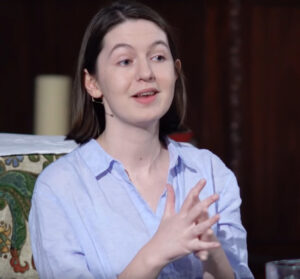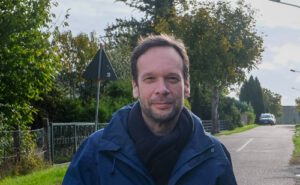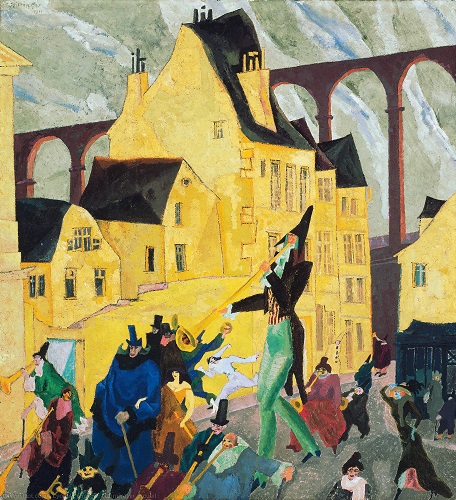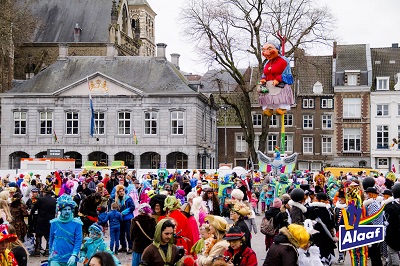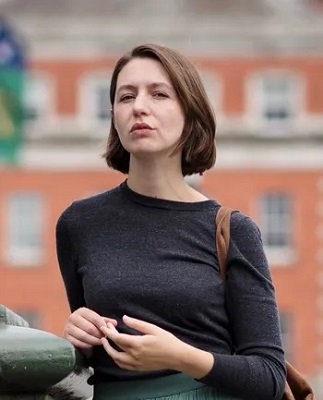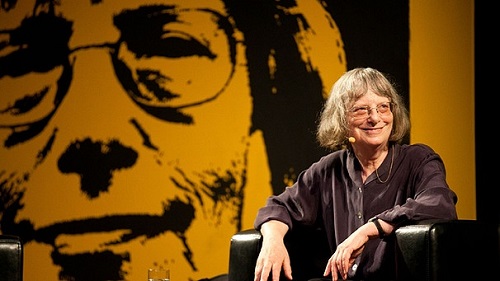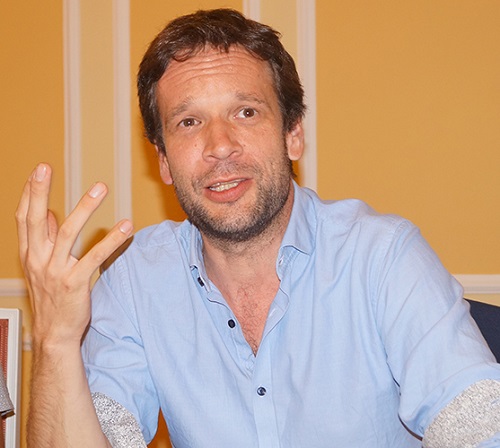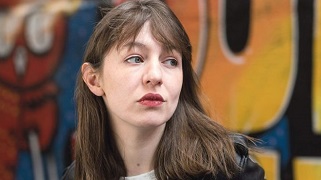De Vlaamse schrijver David Nolens werd geboren in Antwerpen op 20 februari 1973. Zie ook alle tags voor David Nolens op dit blog.
Uit: De kunst van het wachten
“Nadat Jack de laatste hand had gelegd aan een campagne voor de push-upslip voor mannen, die een pronte bips beloofde, ging hij woedend over zoveel banaliteit de straat op. Dat hij zich had gespecialiseerd in dit soort campagnes en dat hij daar goed zijn geld mee verdiende, was hem een doorn in het oog. Hij was inmiddels midden dertig en wat had hij bereikt? Hij was partner in een succesvol reclamebureau. Hij woonde in een mooi en ruim appartement in het centrum van Brussel. Hij was vrijgezel en werd begeerd. Als hij zijn aandeel in het agentschap zou verkopen, zou hij op voorwaarde van een sobere levensstijl kunnen rentenieren. Dit korte lijstje was de mantra waarmee hij zich steeds weer het geluk aanpraatte. Een soort rationeel geluk, louter gebaseerd op de feiten van zijn comfort. Hoe hard hij ook nadacht, hij vond geen noemenswaardig probleem dat het geluk ondergroef. Maar de pushupslip had vreemd genoeg iets in hem losgemaakt. Hij had enkele dagen voordien zelf de push-upslip aangepast en er een hele dag in rondgelopen, om zich zo in zijn product in te leven. Sindsdien was er iets veranderd. Hij had het verschrikkelijke gevoel gehad dat hij als volwassen man een luier droeg. En dat gevoel had hij niet van zich af kunnen schudden, ook niet nadat hij de push-upslip had uitgedaan. Zelfs naakt werd hij nog de dikke met siliconen gevulde stof op zijn achterwerk gewaar. ’s Nachts droomde hij van zichzelf aIs baby en overdag leek het of elke volwassene hem spottend toegrijnsde.
Vanuit die onmachtige woede ging hij, in een ruimte van mutsen, sjaals en bottines, de straat op. De eerste voorbijganger, een man met een zwart hoedje op zijn hoofd, gaf hij een klap in het gezicht, hard genoeg om zijn hand te voelen nagloeien, en vervolgens wandelde hij verder, zonder naar hem om te kijken.
Hij had zijn schaatsmuts tot ver over zijn oren getrokken en zijn handen diep in zijn zakken gestoken. Maar tegelijk was hij verheugd over wat hij had gedaan en moest hij onwillekeurig denken aan al die meisjes, die eindeloze rij blanke wichtjes met purperen lipjes die dagelijks in hun arm krasten, om het gevoel te hebben dat ze leefden. Precies dat gevoel nam ook bij Jack de overhand, met dit verschil dat hij iemand anders en niet zichzelf pijn had gedaan. Er hingen donkere wolken boven de stad en het begon zacht te druppelen. De straatwandelaars gingen gehaaster lopen, maar de man vóór hem op het voetpad hield halt en draaide zich om, waarop Jack tegen hem aanbotste.
Nog voor de man zich kon verontschuldigen, riep Jack: ‘Wat is dat toch met u?!’ Het was een deftige man, type kunstdocent. Eerst keek hij hem geschrokken aan, maar toen begon de man te lachen om Jacks absurde uitspraak en Jack besefte, alsof hij hem tot diep binnenin kon lezen, dat hij wist dat hij niet hem maar zichzelf had toegeroepen, dat hij eigenlijk had bedoeld: ‘Wat is dat toch met mij?!’
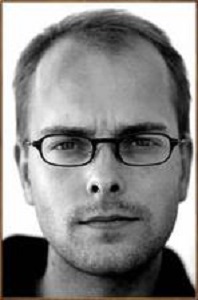
David Nolens (Antwerpen, 20 februari 1973)
De Nederlandse dichter Pieter Cornelis Boutens werd geboren in Middelburg op 20 februari 1870. Zie ook alle tags voor P. C. Boutens op dit blog.
In ’t huis van Smart
In ’t huis van Smart, waar ik belandde
Bij ’t jammerlijkste dansjolijt,
Zag ‘k Zorg en Ouderdom en Spijt
Dansen of zij ’t van buiten kenden.
De Tamboerijn, bij naam Ellende,
Gaf, hoog bevel, de stok respijt
In ’t huis van Smart, waar ik belandde
Bij ’t jammerlijkste dansjolijt.
In huilgezangen brak de bende
Buiten muziek en maat en tijd –
Verveeld, van angst mijzelve kwijt,
Sliep ‘k in, vóór het nog erger endde,
In ’t huis van Smart, waar ik belandde.
Uit: Strofen en andere verzen uit de nalatenschap van Andries de Hoghe
Tiende strofe (Fragment)
Die lichte god bemint de heimlijkheid
van jonge menschenzielen, in het donker
der teedre harten viert hij zijn geboorten;
en, wreede zegen zijnen uitverkoornen,
wijdt hij hun leven tot een zalige onrust,
éen wrange jeugd van onvervuld verlangen,
éen bloesem naar geluk. Verdwaasd en eenzaam
dolen zij door dit ruchtig volk waar elk
uit troeblen waan van zelfvergetelheid
puurt de openbaring van zijn poovre zelf,
en dan met loomer voet die leêge vondst
te ontloopen zoekt in altijd schaamler schijn,
tot nergens toevlucht blijft dan in den dood..
Maar zij gaan eenzaam, buiten elk verband.
Door roep van liefdeloosheid en verwijt
van zelfzucht dragen zij hun duistren schat,
levend-albasten glansdoorschenen lijven
van zulk een zuiversterke lieflijkheid
als nimmer de armoê dezer wereld kan
erkennen voor haar rijkst voldragen wonder.
Ook duldt hun jeugd den blinden kommer niet
dier goddlijk-zwangere verlorenheid,
maar doet zich zelf het smartlijkst ongelijk:
de wanhoop naar ’t ontastbaar na geluk
benijdt der anderen vreemdroode liefden,
en strekt de hand naar den gereeden beker;
maar de éene teug van overkruiden wijn
prikkelt met duur van overwakkre ellende
de moede wake van hun eeuwgen droom.
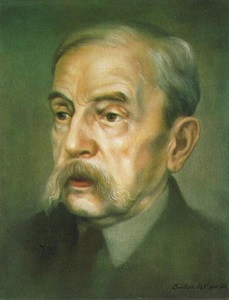
Pieter Cornelis Boutens (20 februari 1870 – 14 maart 1943)
Portret door Chris de Moor, 1942
De Ierse schrijfster Sally Rooney werd geboren op 20 februari 1991 in Castlebar. Zie ook alle tags voor Sally Rooney op dit blog.
Uit: Normal People
“After the first time they had sex, Marianne stayed the night in his house. He had never been with a girl who was a virgin before. In total he had only had sex a small number of times, and always with girls who went on to tell the whole school about it afterwards. He’d had to hear his actions repeated back to him later in the locker room: his errors, and, so much worse, his excruciating attempts at tenderness, performed in gigantic pantomime. With Marianne it was different, because everything was between them only, even awkward or difficult things. He could do or say anything he wanted with her and no one would ever find out. It gave him a vertiginous, light-headed feeling to think about it. When he touched her that night she was so wet, and she rolled her eyes back into her head and said: God, yes. And she was allowed to say it, no one would know. He was afraid he would come then just from touching her like that.
In the hallway the next morning he kissed her goodbye and her mouth tasted alkaline, like toothpaste. Thanks, she said. Then she left, before he understood what he was being thanked for. He put the bedsheets in the washing machine and took fresh linen from the hot press. He was thinking about what a secretive, independent-minded person Marianne was, that she could come over to his house and let him have sex with her, and she felt no need to tell anyone about it. She just let things happen, like nothing meant anything to her.
Lorraine got home that afternoon. Before she’d even put her keys on the table she said: Is that the washing machine? Connell nodded. She crouched down and looked through the round glass window into the drum, where his sheets were tossing around in the froth.
I’m not going to ask, she said.
What?
She started to fill the kettle, while he leaned against the countertop.
Why your bedclothes are in the wash, she said. I’m not asking.
He rolled his eyes just for something to do with his face.
You think the worst of everything, he said.
She laughed, fixing the kettle into its cradle and hitting the switch. Excuse me, she said. I must be the most permissive mother of anyone in your school. As long as you’re using protection, you can do what you want.”
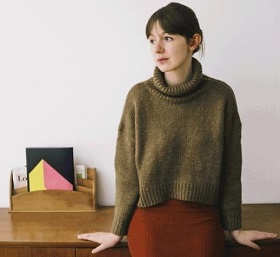
Sally Rooney (Castlebar, 20 februari 1991)
De Amerikaanse schrijfster Ellen Gilchrist werd geboren op 20 februari 1935 in Vicksburg, Mississippi. Zie ook alle tags voor Ellen Gilchrist op dit blog.
Uit: Falling Through Space. The Journals of Ellen Gilchrist
“This is my home. This is where I was born. This is the bayou that runs in my dreams, this is the bayou bank that taught me to love water, where I spent endless summer hours alone or with my cousins. This is where I learned to swim, where mud first oozed up between my toes. This is where I saw embryos inside the abdomens of minnows. This is where I believed that if I was vain and looked too long into the water I would turn into a flower. This is where I learned the legend of the greedy dog. There was an old dog on a raft and he had a bone in his teeth and he looked down into the water and saw a dog carrying a bone and he dropped the one he was holding to snatch the other dog’s bone away and so lost both bones, the real and the imaginary. That’s a new bridge. The one that was here when I was small had a beautiful elaborate scaffolding on top. I thought I must be a princess, of royal blood, to have such a bridge with such a magnificent top. To have such land with so many bugs and a bayou with so many fish and mussels and gars and maybe even alligators. This is the porch that at one time ran all the way around the house. My grandfather built this house and my mother came here when she was four years old. My brother was born in that front bedroom. I was born forty miles away in a hospital and only came here three days later.
The ghost of Eli Nailor walks these halls. He was a black boy who was adopted by my great-great-grandmother when he was orphaned as a child. The woman I am named for raised him. He was the cook in this house all the days of his life and had a cabin beside the kitchen and the gardens and the henhouse and the chickenyard. This was a good life. There were never slaves here. The black people came here after the Civil War; they were free people from Natchez. Black people and white people lived and worked here in harmony. My grandfather thought of himself as an Englishman. He was tall and proud and brave and civilized.
Here is where my Aunt Roberta raised angora rabbits during the Second World War and there is the chickenhouse where I spied on the Broad Jump Pit when my brother and my cousins were training for the Olympics. This is the richest land in the world. The topsoil goes thirteen to eighteen feet in some places. You could grow anything here.”
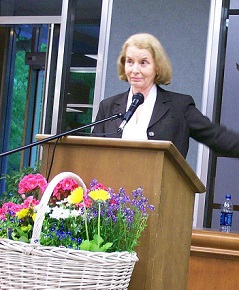
Ellen Gilchrist (Vicksburg, 20 februari 1935)
De Duitse schrijfster Julia Franck werd geboren op 20 februari 1970 in Oost-Berlijn. Zie ook alle tags voor Julia Frank op dit blog.
Uit: Bauchlandung
“Ich knie auf dem Parkett vor dem Sofa und beobachte Luise, wie sie schläft. Sie schläft sich den Rausch ihres Geburtstags aus. Draußen Zionskirchplatz ohne Verkehr, auch von der Kastanienallee höre ich wenig. Luise schmatzt im Schlaf, ganz leise, fast unhörbar. Ich streiche über den Saum des Chiffons, der rauh ihren Hals umschließt, rieche sie, ihren vertrauten Geruch, der mich an frischgeschnittenes Gras erinnert, ziehe die rotblonde Locke aus der Falte, die sich am Hals gebildet hat, und suche die glatte Haut ihrer Wangen ab – ob sich schon im entspannten Zustand eine Spur ihrer Grübchen entdecken läßt? –, ihre Haut ist von blassen Sommersprossen übersät. Ich liebe Luise. Und noch etwas: Sie ist meine Schwester. Es klingelt, sie regt sich nicht. Als ich aufstehe, knarrt das Parkett unter meinen nackten Füßen. Über der Lehne des Sofas hängt ihr schwarzes Lederbustier, ich nehme es, der warme Geruch steigt in meine Nase, ich ziehe es an. Meine Brüste haben Platz in den Schalen, beim Gehen stoßen sie vorn an das Leder. Draußen im Flur schlüpfe ich in ihre Schuhe: leichte altmodische Schuhe mit Absätzen, die laut sind und das Parkett zerkratzen, ich drücke auf den Summer und gehe in die Küche, wo über dem Stuhl mein Kleid hängt. Ich streife es über und bemerke, daß die langen Träger des Kleides viel von dem Bustier sehen lassen, aber es ist zu spät, etwas anderes zu suchen. Ich bleibe hinter der angelehnten Tür stehen und lausche in das Treppenhaus, bis ich die Schritte auf dem letzten Absatz höre. Ich öffne. »Was machst du hier?« frage ich Olek, fast möchte ich sagen: Sie empfängt noch nicht. »Zu Luise«, sagt er hastig, er möchte zu Luise, fährt sich durch die kurzen verklebten Haare, ich lasse ihn herein, und sein nackter Arm berührt meinen. »Sie schläft noch«, sage ich und lehne mich an den Rahmen der Küchentür. »Dann weck sie, es ist wichtig, ich muß sie sehen.« »Und warum warst du dann gestern nicht da?« »Bei ihrem Geburtstag? Sie hat mich ausgeladen.« Olek möchte an mir vorbei, ich suche die zufällige Berührung, aber er weicht aus und tritt in die Küche. Der Kragen seines T-Shirts ist etwas schmuddelig, die Sonne hat seinen Nacken gerötet. Ich schließe die Wohnungstür. Sein Blick fliegt über die benutzten Gläser, die überall auf den Fensterbrettern und Regalen stehen.
Er dreht sich zu mir um, die Unruhe in seinen Augen amüsiert mich, ich muß an die zwei anderen Liebhaber denken, die gestern unter den Gästen waren und Luiseden Abend versüßt haben, bevor sie nacheinander gegangen sind. »Was ist es denn, was dich so aufregt?« frage ich mit leichtem Spott. »Der Hund, er wurde angefahren.« Olek sieht mich nicht an, ich erinnere mich, daß Luise ihm vor wenigen Tagen ihren Hund anvertraut hat, damit die Geburtstagsgäste nicht gestört würden. Er knetet seine Hände, und ich sehe die Adern an seinen Unterarmen hervortreten.“
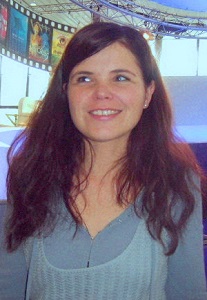
Julia Franck (Oost-Berlijn, 20 februari 1970)
De Franse schrijver Georges Bernanos werd geboren in Parijs op 20 februari 1888. Zie ook alle tags voor Georges Bernanos op dit blog.
Uit: Journal d’un curé de campagne
« Mais enfin j’étais très fier d’avoir à leur parler d’autre chose que des problèmes de fractions, du droit civique, ou encore de ces abominables leçons de choses, qui ne sont en effet que des leçons de choses et rien de plus. L’homme à l’école des choses ! Et puis j’étais délivré de cette sorte de crainte presque maladive, que tout jeune prêtre éprouve, je pense, lorsque certains mots, certaines images lui viennent aux lèvres, d’une raillerie, d’une équivoque, qui brisant notre élan, fait que nous nous en tenons forcément à d’austères leçons doctrinales dans un vocabulaire si usé mais si sûr qu’il ne choque personne, ayant au moins le mérite de décourager les commentaires ironiques à force de vague et d’ennui. À nous entendre on croirait trop souvent que nous prêchons le Dieu des spiritualistes, l’Être suprême, je ne sais quoi, rien qui ressemble, en tout cas, à ce Seigneur que nous avons appris à connaître comme un merveilleux ami vivant, qui souffre de nos peines, s’émeut de nos joies, partagera notre agonie, nous recevra dans ses bras, sur son cœur.
J’ai tout de suite senti la résistance des garçons, je me suis tu. Après tout, ce n’est pas leur faute, si à l’expérience précoce des bêtes – inévitable – s’ajoute maintenant celle du cinéma hebdomadaire.
Quand leur bouche a pu l’articuler pour la première fois, le mot amour était déjà un mot ridicule, un mot souillé qu’ils auraient volontiers poursuivi en riant, à coups de pierres, comme ils font des crapauds. Mais les filles m’avaient donné quelque espoir, Séraphita Dumouchel surtout. C’est la meilleure élève du catéchisme, gaie, proprette, le regard un peu hardi, bien que pur. J’avais pris peu à peu l’habitude de la distinguer parmi ses camarades moins attentives, je l’interrogeais souvent, j’avais un peu l’air de parler pour elle. La semaine passée, comme je lui donnais à la sacristie son bon point hebdomadaire – une belle image – j’ai posé sans y penser les deux mains sur ses épaules et je lui ai dit : « As-tu hâte de recevoir le bon Jésus ? Est-ce que le temps te semble long ? – Non, m’a-t-elle répondu, pourquoi ? Ça viendra quand ça viendra. » J’étais interloqué, pas trop scandalisé d’ailleurs, car je sais la malice des enfants. J’ai repris : « Tu comprends, pourtant ? Tu m’écoutes si bien ! » Alors son petit visage s’est raidi et elle a répondu en me fixant : « C’est parce que vous avez de très beaux yeux. »
Je n’ai pas bronché, naturellement, nous sommes sortis ensemble de la sacristie et toutes ses compagnes qui chuchotaient se sont tues brusquement, puis ont éclaté de rire. Évidemment, elles avaient combiné la chose entre elles. »
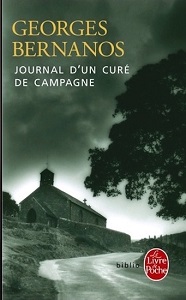
Georges Bernanos (20 februari 1888 – 5 juli 1948)
Cover
De Ierse schrijver William Carleton werd geboren op 20 februari 1794 in Glogher, in het graafschap Tyrone. Zie ook alle tags voor William Carleton op dit blog.
Uit: The Emigrants Of Ahadarra
“On the drawing-room stairs there lay what had once been a carpet, but so inseparable had been their connexion that the stairs were now worn through it, and it required a sharp eye to distinguish such fragments of it as remained from the colour of the dirty boards it covered and the dust that lay on both. On entering the kitchen Peety and his little girl found thir-teen or fourteen, in family labourers and servants of both sexes, seated at a long deal table, each with a large wooden noggin of buttermilk and a spoon of suitable dimensions, dig-ging as if for a wager into one or other of two immense wooden bowls of stirabout so thick and firm in consistency that, as the phrase goes, a man might dance on it. This however was not the only picture of such enjoyment that the kitchen afforded. Over beside the dresser was turned upon one side the huge pot in which the morning meal had been made, and at the bottom of which, inside of course, a spirit of rivalry equally vigorous and animated, but by no means so harmonious’, was kept up by two dogs and a couple of pigs, which were squab-bling and whining and snarling among each other, whilst they tuned away at the scrapings or residuum that was left behind after the stirabout had been emptied out of it. The whole kitchen, in fact, had a strong and healthy smell of food—the dresser, a huge one, was covered with an immense quantity of pewter, wood, and doff; and it was only necessary to cast one’s eye towards the chimney to perceive by the weighty masses of black hung beef and the huge sides and flitches of deep yellow bacon which lined it, that plenty and abundance, even to overflowing, predominated in the family. The ” chimney brace” nrn!reqri Car out over the fireplace towards the floor, and under it on each side stretched two long nobs or chimney conisr seats, on which nearly a dozen persons could sit of a winter evening.”
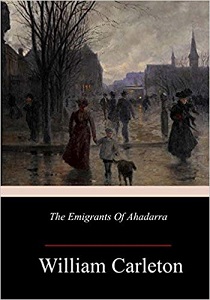
William Carleton (20 februari 1794 – 30 januari 1869)
Cover
De Nederlandse dichter, liedtekstschrijver, toneelschrijver en boekhandelaar Cornelis Sweerts werd geboren in Amsterdam op 20 februari 1669. Zie ook alle tags voor Cornelis Sweerts op dit blog.
O welvernoegde zinnen
O welvernoegde zinnen,
Gy baart een zaligheid,
Die Minnaars niet beminnen,
Wiens vryheid neder leit.
Hoe vlieten uwe dagen,
In zoete rust voorby
Wyl haar de min doet klagen,
Van smert en razerny,
Ik wil gelyk de blinden,
Myn vryheid aan geen kroon,
Noch gulde ketens binden,
Geen goud en blinkt zo schoon.
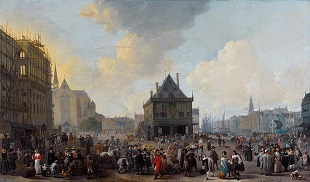
Cornelis Sweerts (20 februari 1669 – 23 maart 1749)
Amsterdam, gezicht op de Dam met het stadhuis in aanbouw door Johannes Lingelbach, 1656
De Duitse dichter, schrijver en vertaler Johann Heinrich Voß werd geboren op 20 februari 1751 in Sommersdorf / Mecklenburg. Zie ook alle tags voor Johann Heinrich Voß op dit blog.
Willkommen im Grünen!
Willkommen im Grünen!
Der Himmel ist blau,
Und blumig die Au,
Der Lenz ist erschienen!
Er spiegelt sich hell
Am luftigen Quell,
Willkommen im Grünen!
Willkommen im Grünen!
Das Vögelein springt
Auf Sproßen und singt:
Der Lenz ist erschienen!
Im säuselt der West
Ums heimliche Nest,
Willkommen im Grünen!
Stand und Würde
Der adliche Rat
Mein Vater war ein Reichsbaron!
Und Ihrer war, ich meine…?
Der bürgerliche Rat
So niedrig, daß, mein Herr Baron,
Ich glaube, wären Sie sein Sohn,
Sie hüteten die Schweine.
Schlaue Liebe
Mein Weibchen traun verschenkt’ ich nicht,
Wär’s auch erlaubt; denn Paulus spricht:
Was Ihr verschenkt, Ihr lieben Brüder,
Bekommt ihr doppelt wieder.
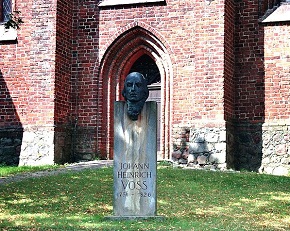
Johann Heinrich Voß (20 februari 1751 – 29 maart 1826)
Monument in Penzlin
Zie voor nog meer schrijvers van de 20e februari ook mijn blog van 20 februari 2018 en eveneens mijn blog van 20 februari 2016 deel 2.
